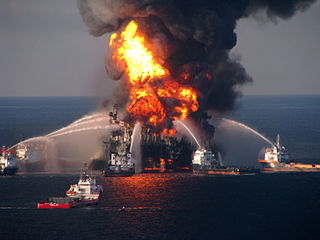Related Research Articles
The Abuja bus crash riots were an outbreak of violent riots following a massive multi-bus pile up at Abuja central bus station in Nigeria.

EAS Airlines Flight 4226 was a scheduled domestic passenger flight from Kano to Lagos, Nigeria. On 4 May 2002, the aircraft serving the route, a BAC One-Eleven 525FT with 69 passengers and 8 crew members on board, crashed into Gwammaja Quarters, a densely-populated residential area located approximately three kilometres from the airport, and burst into flames, resulting in the deaths of 66 passengers and 7 crew. In addition, at least 30 civilians on the ground were killed. With a total of 103 fatalities, Flight 4226 is the deadliest aviation accident involving a BAC One-Eleven.

The Jaipur oil depot fire broke out on 29 October 2009 at 7:30 PM (IST) at the Indian Oil Corporation (IOC) oil depot's giant tank holding 8,000 kilolitres (280,000 cu ft) of petrol, in Sitapura Industrial Area on the outskirts of Jaipur, Rajasthan, killing 12 people and injuring over 300. The blaze continued to rage out of control for over a week after it started and during the period half a million people were evacuated from the area. The oil depot is about 16 kilometres (9.9 mi) south of the city of Jaipur.

Energy resources bring with them great social and economic promise, providing financial growth for communities and energy services for local economies. However, the infrastructure which delivers energy services can break down in an energy accident, sometimes causing considerable damage. Energy fatalities can occur, and with many systems deaths will happen often, even when the systems are working as intended.
The Kallar Kahar school bus accident was a school bus road accident that occurred on 27 September 2011 near the town of Kallar Kahar in the Chakwal District of Punjab, Pakistan. 37 people, mostly school students, were killed in the disaster.

Elsterwerda station is in the town of Elsterwerda in the German state of Brandenburg. It lies on the Berlin–Dresden railway. The station is known for a train crash in 1997, when a freight train with 22 petrol tankers derailed and exploded on the station premises.
The Otedola Bridge fire accident occurred on the Otedola Bridge at the Lagos end of the Lagos-Ibadan Expressway where a tanker lorry fully loaded with petroleum product fell, leaked and exploded on 28 June 2018.

On December 23, 1988, a tractor-trailer tanker truck hauling liquefied propane crashed on an exit ramp at the Interstate 40/Interstate 240 (I-40/I-240) interchange in downtown Memphis, Tennessee, US. The crash ruptured the tank; the leaking gas exploded, setting multiple vehicles and structures on fire. The explosion propelled the tank 125 yards (114 m) into a residential complex and started additional fires. The accident caused nine deaths and ten injuries. The interchange where the accident occurred was considered unsafe and poorly designed, and had been the site of several previous accidents; it was completely rebuilt in the 2000s.

On 5 November 2021 a collision between a petrol fuel tanker and a lorry at a busy junction of Sierra Leone's capital, Freetown, resulted in an explosion and a fire that caused 154 deaths and 304 injuries, overwhelming the city's medical services.

On 18 December 2022, a tanker truck exploded in the Salang Tunnel in Afghanistan, killing at least 31 people.
The Boksburg explosion took place on 24 December 2022, when a fuel tanker carrying liquefied petroleum gas (LPG) exploded underneath a railway bridge in Boksburg, in the Ekurhuleni Metropolitan Municipality in Gauteng, South Africa, with a death toll of 41 people as of 18 January 2023. Nearby infrastructure was damaged by the explosion.
The 2004 Nosratabad fuel tanker explosion was a catastrophic incident that took place on 24 June 2004, near Iran's border with Afghanistan, resulting in at least 90 fatalities and 114 injuries. The disaster occurred when a petrol truck lost control and collided with a bus at the Nosratabad police checkpoint, located about 110 kilometres (68 mi) west of Zahedan.
On 15 October 2024, a fuel tanker exploded in Majiya, Jigawa State, Nigeria, killing 209 people and injuring 124 others.
On January 18, 2025, a fuel tanker carrying roughly 60,000 liters of petrol overturned at the Dikko junction near Suleja, Niger State, northern Nigeria, where after crashing local residents gathered to collect spilled fuel. The fuel promptly caused an explosion which killed 77 people and injured another 55.
References
- ↑ Moses Adeniyi (18 November 2019), Tanker-caused-accidents; DPR’s years of silence amidst tears, Nigerian News Direct
- ↑ Nigeria tanker inferno kills over 100, BBC, 6 November 2000
- ↑ 150 killed in Nigerian crash, Namibian, 7 November 2000, archived from the original on 1 November 2005